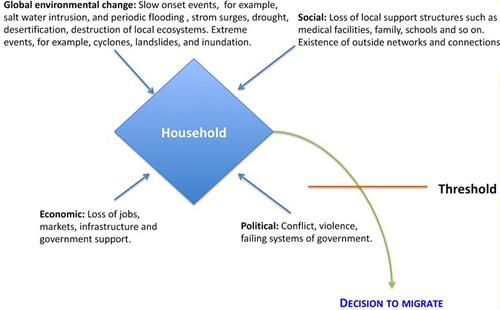当前位置:
X-MOL 学术
›
WIREs Clim. Chang.
›
论文详情
Our official English website, www.x-mol.net, welcomes your
feedback! (Note: you will need to create a separate account there.)
Cross-border migration on a warming planet: A policy framework
WIREs Climate Change ( IF 9.4 ) Pub Date : 2022-01-18 , DOI: 10.1002/wcc.763 Sujatha Byravan 1 , Sudhir C. Rajan 2
WIREs Climate Change ( IF 9.4 ) Pub Date : 2022-01-18 , DOI: 10.1002/wcc.763 Sujatha Byravan 1 , Sudhir C. Rajan 2
Affiliation

|
Migration is frequently driven by the need to improve social and economic opportunities or to flee conditions of political insecurity. The increased risks of environmental hazards, including climate change, have intensified the push to migrate. Nevertheless, the relation between climate change and forced displacement is not direct and is complicated by globalization, local ecological conditions, and deteriorating domestic institutions. Significantly, the muddy situation means the question “did this person migrate because of climate change?” may never be fully answered. On the basis of ethical arguments, in this Perspective article we propose a framework with both strong and mild responses to address cross-border migration. The strong version acknowledges that it is impossible to separate out fully the climate-induced causes of migration from others and using climate attribution studies for this purpose is potentially harmful. This implies designing an open door policy for asylum seekers as the impacts of climate change unfold, bearing in mind that host countries having the most responsibility for climate change ought to be the most welcoming to them. In the mild version, the international community designates vulnerable zones, areas where significant land area is susceptible to overwhelming loss and damage. Such countries would include most small-island states, those that are severely drought-prone and those with substantial low-lying deltaic areas. In both the mild and strong versions, asylum seekers are provided rights of free passage to host countries under nonrefoulement, so that they are not forced to return to their unliveable or unviable home countries and face continuing harm.
中文翻译:

变暖星球上的跨境移民:政策框架
移民往往是出于改善社会和经济机会或逃离政治不安全条件的需要。包括气候变化在内的环境危害风险增加,加剧了移民的推动力。然而,气候变化与被迫流离失所之间的关系并不直接,而且由于全球化、当地生态条件和国内制度的恶化而变得复杂。值得注意的是,泥泞的情况意味着“这个人迁移是因为气候变化吗?”的问题。可能永远无法完全回答。基于道德论点,在这篇 Perspective 文章中,我们提出了一个框架,该框架具有强烈和温和的反应来解决跨境移民问题。强版本承认,不可能将气候引起的迁移原因与其他原因完全区分开来,为此目的使用气候归因研究可能是有害的。这意味着随着气候变化影响的展开,为寻求庇护者设计一项开放政策,同时牢记对气候变化负有最大责任的东道国应该最欢迎他们。在温和的版本中,国际社会指定了脆弱区域,即大面积土地容易遭受巨大损失和破坏的区域。这些国家将包括大多数小岛屿国家、严重干旱的国家和拥有大量低洼三角洲地区的国家。在温和版和强版中,寻求庇护者都有权自由进入东道国 这意味着随着气候变化影响的展开,为寻求庇护者设计一项开放政策,同时牢记对气候变化负有最大责任的东道国应该最欢迎他们。在温和的版本中,国际社会指定了脆弱区域,即大面积土地容易遭受巨大损失和破坏的区域。这些国家将包括大多数小岛屿国家、严重干旱的国家和拥有大量低洼三角洲地区的国家。在温和版和强版中,寻求庇护者都有权自由进入东道国 这意味着随着气候变化影响的展开,为寻求庇护者设计一项开放政策,同时牢记对气候变化负有最大责任的东道国应该最欢迎他们。在温和的版本中,国际社会指定了脆弱区域,即大面积土地容易遭受巨大损失和破坏的区域。这些国家将包括大多数小岛屿国家、严重干旱的国家和拥有大量低洼三角洲地区的国家。在温和版和强版中,寻求庇护者都有权自由进入东道国 国际社会划定了脆弱区域,即大片土地容易遭受巨大损失和破坏的区域。这些国家将包括大多数小岛屿国家、严重干旱的国家和拥有大量低洼三角洲地区的国家。在温和版和强版中,寻求庇护者都有权自由进入东道国 国际社会划定了脆弱区域,即大片土地容易遭受巨大损失和破坏的区域。这些国家将包括大多数小岛屿国家、严重干旱的国家和拥有大量低洼三角洲地区的国家。在温和版和强版中,寻求庇护者都有权自由进入东道国不驱回,这样他们就不会被迫返回不适合居住或不适合生存的祖国并面临持续的伤害。
更新日期:2022-01-18
中文翻译:

变暖星球上的跨境移民:政策框架
移民往往是出于改善社会和经济机会或逃离政治不安全条件的需要。包括气候变化在内的环境危害风险增加,加剧了移民的推动力。然而,气候变化与被迫流离失所之间的关系并不直接,而且由于全球化、当地生态条件和国内制度的恶化而变得复杂。值得注意的是,泥泞的情况意味着“这个人迁移是因为气候变化吗?”的问题。可能永远无法完全回答。基于道德论点,在这篇 Perspective 文章中,我们提出了一个框架,该框架具有强烈和温和的反应来解决跨境移民问题。强版本承认,不可能将气候引起的迁移原因与其他原因完全区分开来,为此目的使用气候归因研究可能是有害的。这意味着随着气候变化影响的展开,为寻求庇护者设计一项开放政策,同时牢记对气候变化负有最大责任的东道国应该最欢迎他们。在温和的版本中,国际社会指定了脆弱区域,即大面积土地容易遭受巨大损失和破坏的区域。这些国家将包括大多数小岛屿国家、严重干旱的国家和拥有大量低洼三角洲地区的国家。在温和版和强版中,寻求庇护者都有权自由进入东道国 这意味着随着气候变化影响的展开,为寻求庇护者设计一项开放政策,同时牢记对气候变化负有最大责任的东道国应该最欢迎他们。在温和的版本中,国际社会指定了脆弱区域,即大面积土地容易遭受巨大损失和破坏的区域。这些国家将包括大多数小岛屿国家、严重干旱的国家和拥有大量低洼三角洲地区的国家。在温和版和强版中,寻求庇护者都有权自由进入东道国 这意味着随着气候变化影响的展开,为寻求庇护者设计一项开放政策,同时牢记对气候变化负有最大责任的东道国应该最欢迎他们。在温和的版本中,国际社会指定了脆弱区域,即大面积土地容易遭受巨大损失和破坏的区域。这些国家将包括大多数小岛屿国家、严重干旱的国家和拥有大量低洼三角洲地区的国家。在温和版和强版中,寻求庇护者都有权自由进入东道国 国际社会划定了脆弱区域,即大片土地容易遭受巨大损失和破坏的区域。这些国家将包括大多数小岛屿国家、严重干旱的国家和拥有大量低洼三角洲地区的国家。在温和版和强版中,寻求庇护者都有权自由进入东道国 国际社会划定了脆弱区域,即大片土地容易遭受巨大损失和破坏的区域。这些国家将包括大多数小岛屿国家、严重干旱的国家和拥有大量低洼三角洲地区的国家。在温和版和强版中,寻求庇护者都有权自由进入东道国不驱回,这样他们就不会被迫返回不适合居住或不适合生存的祖国并面临持续的伤害。











































 京公网安备 11010802027423号
京公网安备 11010802027423号